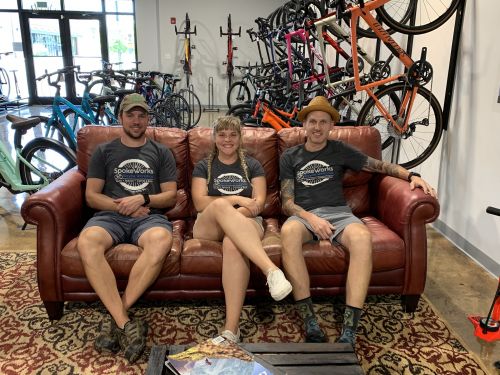SUMMERVILLE, S.C. (BRAIN) — Sometime about nine months or a year after the start of the pandemic in the U.S., a new generation of bike shops will be born, their conception inspired by the 2020 bike boom.
The well-documented boom is a clear motivator for would-be entrepreneurs, as local and national mainstream media is filled with stories about the nation's run on bike shops. For those who take their time planning and educating themselves, even the current bike shortage might be over by the time they open.
And for many of those getting ready to nail up their bike shop shingle, it's not the lure of a quick buck that drove them. It was more of a lifestyle decision inspired by the sobering realities of a pandemic that has already claimed more than 160,000 U.S. lives, said David DeKeyser, the director of the National Bicycle Dealer Association's P2 Consulting Service and a BRAIN columnist.
In recent months DeKeyser has been advising a growing number of people interested in opening shops.
"Some of them are doing this because there's a bike boom, but most of them are more like, 'life is short, the world is weird. I don't know that I want to sit in this cubicle the rest of my life,'" DeKeyser said.
No turning back
One of DeKeyser's consulting clients, Michael Haldeman, was motivated by similar feelings. Although he opened his store in the heart of the pandemic, he began planning it long before.
"I was a university professor. All my degrees are in music. I have a doctorate in percussion performance. But I was super burnt out from teaching," Haldeman told BRAIN. "I was into mountain biking for a while and I always thought it would be cool to own a business. My wife has a master's degree in business and she always said I'd be good at it.
"So last summer, a little over a year ago, I started planning. I was staring down the barrel of turning 40, I was really unhappy teaching ... I have a four-year-old son and I didn't want to be that father who comes home from work unhappy.
"So I wrote a business plan at the end of July 2019. I contacted David and got in touch with the NBDA and became a member ... we had our grand opening here June 2."
Haldeman had serious concerns when the pandemic began, but by that point, it was too late.
"There were a couple of weeks there when I was like, 'What have I done?'" he said. "I had already signed the lease. At that point I had no choice — There's no turning back."
Doing their homework
Like Haldeman did last year, many of this year's would-be bike entrepreneurs seem to be doing their COVID homework. They are reaching out to the NBDA in record numbers, buying the group's landmark "Cost of Doing Business" report and often connecting with DeKeyser.
Brandee Lepak, the NBDA's president, since she welcomes a new group of prepared IBDs.
"You would think it's a crazy time because of the inventory issues, the tariff issues, what is commercial real estate going to be doing over the next few years? ... But it could be a prime time to ride this wave," Lepak said.
"I'm really excited that if people are going to do it, they are doing it right," she said. "How much of it is COVID?" It's fair to say that since opening, revenues have exceeded forecast at Haldeman's store, SpokeWorks Bicycle Workshop.
"We're just seven weeks in now and I tend to be a realist about numbers because I'm so new to small business ownership and the situation is so odd, but even though we can't get all the inventory we want to get, we are still doing well. I made sales projections for the first six months and we are blowing that out of the water. I don't know how much of it is the COVID and how much is that I picked a good spot," Haldeman said.
His store is in a new retail development in Summerville, a town of about 52,000 about 25 minutes from Charleston. Summerville is growing quickly and has an active road and triathlon community, and a smaller mountain bike community. There are just two other bike shops in town, one of which also opened this year. His store is close to a greenway path that leads to a mountain bike trail.
Haldeman carries Specialized, Salsa and Felt bikes, and his shop includes a cafe area with a couch where he serves espresso drinks using a proprietary coffee roast from a nearby roaster. He also offers local craft beers and cider by the can. Operating in the pandemic conditions hasn't been too much of a burden. The state deemed bike shops essential businesses early in the pandemic.
"We didn't make any changes to the store layout, or put in [plexiglass] guards or anything like that. We do have hand sanitizer available and we wipe things down.


